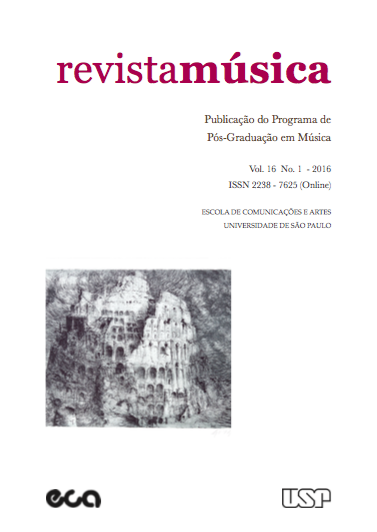Marsilio Ficino, Francesco Cavalli and Music as a Remedy for Lovesickness
DOI:
https://doi.org/10.11606/rm.v16i1.125009Keywords:
Marsilio Ficino, Francesco Cavalli, imagination, lovesickness, music therapy.Abstract
In this article, the philosopher Marsilio Ficino (1433 - 1499) and the composer Francesco Cavalli (1602 - 1676) are presented as belonging to one and the same universe of discourse, in which music, love, and the imagination play a fundamental role. Ficino’s Neoplatonic theory of love plays a central role in his philosophy. He defines love as the desire for beauty. Beautiful things such as harmonious music inspire the soul with love. When music is loved properly, the lover distances himself from the sensible world, focuses his attention on his soul, and thus ultimately finds his end in God. However, if the soul loves improperly and becomes fixated on the sensual beauty of music, this results in lovesickness. Thus, for Ficino, the proper application of love and music lie at the heart of human happiness. A secularized echo of this theory can be heard in the Cavalli’s opera Artemisia.Downloads
References
AUSTERN, Linda Phyllis. Musical Treatments for Lovesickness. In: HORDEN, Peregrine (ed.). Music as Medicine: The History of Music Therapy Since Antiquity. Aldershot: Ashgate, 2000, p. 195-245.
BARKER, Andrew. Greek Musical Writings. Cambridge: Cambridge University Press. 1984 (v. 1).
CAVALLI. Artemisia: Dramma per Musica. Kassel: Bärenteiter, 2013 (ed. Hendrik Schulze).
DAWSON, Lesel. Lovesickness and Gender in Early Modern English Literature. Oxford: New York: Oxford University Press, 2008.
FICINO, Marsilio. Commentaria in Platonem. Firenze: Laurentius (Francisci) de Alopa, 1496.
__________. Commentary on Plato’s Symposium [De amore ou Commentarium in Convivium Platonis] Columbia [Firenze]: The University of Missouri Studies, 1944 [1469]. Trad. Sears Reynolds Jayne.
__________. Medicina corpus, musica spiritus, theologia animum. In: The Letters of Marsilio Ficino. London: Shepheard Walwyn, 1975, vol.1. Trad. membros do Language Department of the School of Economic Science, London.
__________. Opera Omnia. Turin [Basel]: Heinrich Petri, 1959 [1576]
__________. Three Books on Life [De Vita triplici]. Binghamton, NY: Medieval and Renaissance Texts and Studies/Renaissance Society of America [Firenze: Antonio di Bartolomeo Miscomini], 1989 [1489]. Trad. Carol V. Kaske e John R. Clark.
GIGLIONI, Guido. Coping with Inner and Outer Demons: Marsilio Ficino’s Theory of the Imagination. In: HASKELL, Yasmin (ed.). Diseases of the Imagination and Imaginary Disease in the Early Modern Period. Turnhout: Brepols, 2011, p, 19-51.
KLIBANSKY, Raymond, E. Panofsky e F. Saxl. Saturn and Melancholy: Studies in the History of Natural Philosophy, Religion, and Art. New York: Basic Books, 1964.McCLURE, George W. Sorrow and Consolation in Italian Humanism. Princeton, NJ: Princeton University Press, 1991.
MINATO, Nicolò. Artemisia: Dramma per Musica (libreto). Kassel: Bärenteiter, 2013 (ed. Sara Elisa Stangalino).
PLATÃO. A República. Lisboa: Gulbenkian, 2001.
PRINS, Jacomien. Echoes of an Invisible World: Marsilio Ficino and Francesco Patrizi on Cosmic Order and Music Theory. Leiden: Brill, 2014.
RICE Jr., Eugene F. The Renaissance Idea of Wisdom. Cambridge, Mass.: Harvard University Press, 1958.
ROSAND, Ellen. Opera in Seventeenth-Century Venice: the Creation of a Genre. Berkeley and Los Angeles, 1991.
__________. (ed.). Readying Cavalli’s Operas for the Stage: Manuscript, Edition, Production. Farnham: Ashgate Interdisciplinary Studies in Opera, 2013.
SCHULZE, HENDRIK. Artemisia. In: CAVINA, Claudio. CAVALLI. Artemisia. CD GCD 920918. Mondovì, 2010, p.8-12.
VECCHIA, Francesco dalla. Key Symbolism in Francesco Cavalli’s Aria’s. 213 p. Tese (Doutorado em Música). Iowa University. Iowa, 2011.
WALKER, Daniel. Spiritual and Demonic Magic from Ficino to Campanella. University Park [London]: Pennsylvania State University Press [Warburg Institute], 2003 [1958], p. 3-24.
WALKER, Thomas e Irene Alm. Francesco Cavalli. In: Grove Music Online. Disponível em: http://www.oxfordmusiconline.com. Acesso: 31 de dezembro de 2014.
WELLS, Marion. The Secret Wound: Love-Melancholy and Early Modern Romance. Stanford, Calif: Stanford University Press, 2007.
Downloads
Published
Issue
Section
License
Copyright (c) 2016 Jacomien Prins

This work is licensed under a Creative Commons Attribution-NonCommercial-ShareAlike 4.0 International License.
Autores que publicam nesta revista concordam com os seguintes termos:
- Autores mantém os direitos autorais e concedem à revista o direito de primeira publicação, com o trabalho simultaneamente licenciado sob a CC Attribution-NonCommercial-ShareAlike 4.0 que permite o compartilhamento do trabalho com reconhecimento da autoria e publicação inicial nesta revista.
- Autores têm autorização para assumir contratos adicionais separadamente, para distribuição não-exclusiva da versão do trabalho publicada nesta revista (ex.: publicar em repositório institucional ou como capítulo de livro), com reconhecimento de autoria e publicação inicial nesta revista.
- Autores têm permissão e são estimulados a publicar e distribuir seu trabalho online (ex.: em repositórios institucionais ou na sua página pessoal) a qualquer ponto antes ou durante o processo editorial, já que isso pode gerar alterações produtivas, bem como aumentar o impacto e a citação do trabalho publicado (Veja O Efeito do Acesso Livre).


